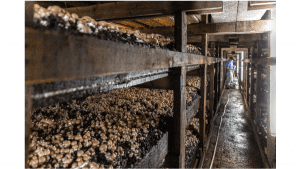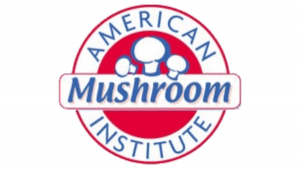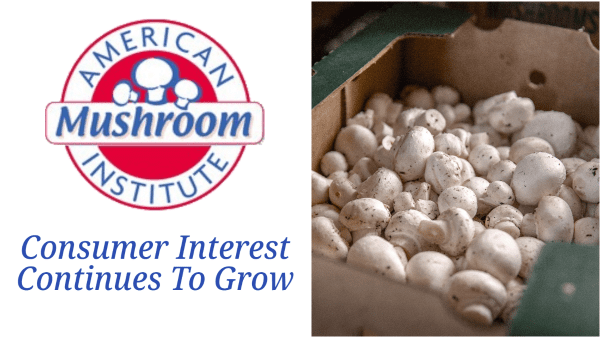Avondale, PA – The volume of sales for the 2021-2022 mushroom crop totaled 702 million pounds, down 7 percent from last season, according to the National Agriculture Statistics Service (NASS) 2022 Report released August 26, 2022. Value of sales for the 2021-2022 mushroom crop was $1.02 billion, down 4 percent from the previous season. The average reported price was $1.45 per pound, up 5 cents from the previous year.
United States fresh market sales of Agaricus mushrooms totaled 616 million pounds, down 8 percent from the previous season, while processed sales, at 64 million pounds, decreased 4 percent from the previous season.
Agaricus mushroom volume of sales totaled 680 million pounds, down 8 percent from the 2020-2021 season. According to the report, brown mushrooms (Portabella and Crimini) accounted for 203 million pounds, up 5 percent from last season. Brown mushrooms accounted for 30 percent of the total Agaricus volume sold and 36 percent of the total Agaricus value.
Value of sales for commercially grown specialty mushrooms in 2021-2022 totaled $87.3 million, up 32 percent from the 2020-2021 season. A specialty grower is defined as having at least 200 natural wood logs in production or some commercial indoor growing area, and $200 or more in sales. The average price received by growers, at $3.88 per pound, was up 67 cents from the previous season estimate.
Growers produced 156 million pounds of mushrooms that were certified organic during the 2021-2022 growing season, 19 percent above 2020-2021. Forty-nine percent of the total, or 76.1 million pounds, were sold as certified organic mushrooms. Agaricus mushrooms accounted for 82 percent of the mushrooms sold as certified organic, while all specialty mushrooms made up the remainder.

“The numbers in this report reflect what we’ve seen in the industry over the past few years,” said American Mushroom Institute BB #:162412 President Rachel Roberts. “Global supply chain availability constraints, a drastically reduced farm labor market, and seasonal threats of crop disease have all impacted mushroom businesses. Because the mushroom growing process integrates many other industries’ products into the growing medium for mushrooms, when availability for any single ingredient is compromised, it impacts growers’ ability to mitigate crop threats and to maximize yields,” Roberts said.
Additionally, when it comes to inflation, mushrooms are not immune. While the price of mushrooms increased over last year, retail price increases this year for mushrooms have remained below average total produce inflation.
“There is no one-size-fits-all way to handle inflationary pressures in 2022,” said Anne Marie Roerink, 210 Analytics. “But we do see some patterns emerge across departments. More than eight in 10 consumers are implementing money-saving measures and that is prompting unit and volume pressure across departments. With very few exceptions, inflation is boosting dollars while units and volume are trending around 2019 levels.”
With all the headwinds facing mushroom growers, consumer demand and interest in mushrooms continue to grow. The report shows increases in brown, specialty, and organic mushrooms, which points to the increasingly health-conscious consumer finding more ways to cook more varieties of mushrooms and include them in daily meals, daily nutritional intake, and dieting continued consumer interest in mushrooms.
“Consumers understand that mushrooms are a force multiplier,” explained Roberts. “One package of mushrooms sliced into a dish can offer a host of health-boosting benefits. A package of mushrooms chopped and blended into ground beef, turkey, or tofu, not only offer flavor—umami—but act as an extender for more burgers, meatballs, and more, a much-needed value add when consumers are looking for ways to address inflation.”
The USDA’s NASS provides an annual report of domestic mushroom production. It covers all domestic production of mushrooms from July 1, 2021, to June 30, 2022. The full report can be found at Mushrooms 08/26/2022 (usda.gov).


The American Mushroom Institute (AMI), headquartered in Avondale, Pennsylvania, is a national voluntary trade association representing the growers, processors, and marketers of cultivated mushrooms in the United States and industry suppliers worldwide. For more information, visit www.americanmushroom.org



